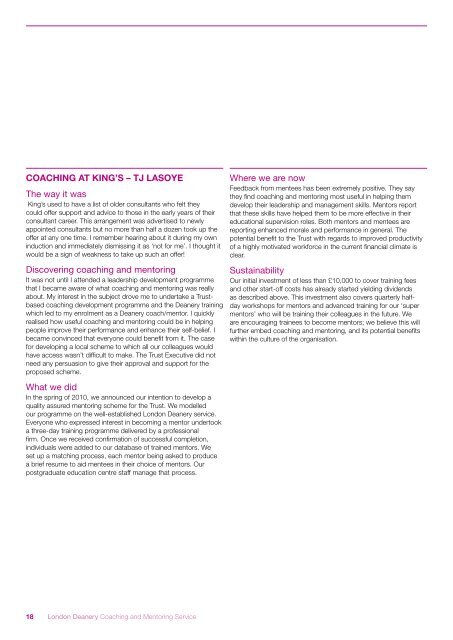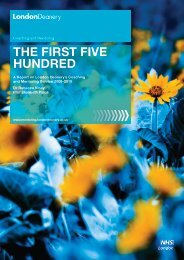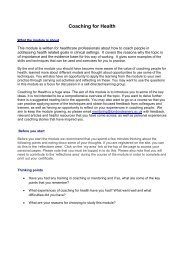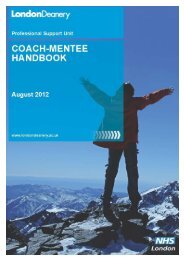REACHING OUT - Mentoring - London Deanery
REACHING OUT - Mentoring - London Deanery
REACHING OUT - Mentoring - London Deanery
Create successful ePaper yourself
Turn your PDF publications into a flip-book with our unique Google optimized e-Paper software.
Coaching at King’s – Tj Lasoye<br />
The way it was<br />
King’s used to have a list of older consultants who felt they<br />
could offer support and advice to those in the early years of their<br />
consultant career. This arrangement was advertised to newly<br />
appointed consultants but no more than half a dozen took up the<br />
offer at any one time. I remember hearing about it during my own<br />
induction and immediately dismissing it as ‘not for me’. I thought it<br />
would be a sign of weakness to take up such an offer!<br />
Discovering coaching and mentoring<br />
It was not until I attended a leadership development programme<br />
that I became aware of what coaching and mentoring was really<br />
about. My interest in the subject drove me to undertake a Trustbased<br />
coaching development programme and the <strong>Deanery</strong> training<br />
which led to my enrolment as a <strong>Deanery</strong> coach/mentor. I quickly<br />
realised how useful coaching and mentoring could be in helping<br />
people improve their performance and enhance their self-belief. I<br />
became convinced that everyone could benefit from it. The case<br />
for developing a local scheme to which all our colleagues would<br />
have access wasn’t difficult to make. The Trust Executive did not<br />
need any persuasion to give their approval and support for the<br />
proposed scheme.<br />
What we did<br />
In the spring of 2010, we announced our intention to develop a<br />
quality assured mentoring scheme for the Trust. We modelled<br />
our programme on the well-established <strong>London</strong> <strong>Deanery</strong> service.<br />
Everyone who expressed interest in becoming a mentor undertook<br />
a three-day training programme delivered by a professional<br />
firm. Once we received confirmation of successful completion,<br />
individuals were added to our database of trained mentors. We<br />
set up a matching process, each mentor being asked to produce<br />
a brief resume to aid mentees in their choice of mentors. Our<br />
postgraduate education centre staff manage that process.<br />
Where we are now<br />
Feedback from mentees has been extremely positive. They say<br />
they find coaching and mentoring most useful in helping them<br />
develop their leadership and management skills. Mentors report<br />
that these skills have helped them to be more effective in their<br />
educational supervision roles. Both mentors and mentees are<br />
reporting enhanced morale and performance in general. The<br />
potential benefit to the Trust with regards to improved productivity<br />
of a highly motivated workforce in the current financial climate is<br />
clear.<br />
Sustainability<br />
Our initial investment of less than £10,000 to cover training fees<br />
and other start-off costs has already started yielding dividends<br />
as described above. This investment also covers quarterly halfday<br />
workshops for mentors and advanced training for our ‘super<br />
mentors’ who will be training their colleagues in the future. We<br />
are encouraging trainees to become mentors; we believe this will<br />
further embed coaching and mentoring, and its potential benefits<br />
within the culture of the organisation.<br />
Coaching for new consultants –<br />
Quen Mok<br />
Stressful start<br />
I found starting as a new consultant in a new hospital very<br />
challenging. Having to find my way around the maze of corridors,<br />
and trying to get to know the key people was a stressful and<br />
daunting prospect. Hence after a few years of being a consultant,<br />
I was keen to join the Trust mentoring scheme for new consultants<br />
which was being started up and supported by the Medical<br />
Director. This seemed a superb idea. Senior staff from the different<br />
health professions and senior managers were encouraged to<br />
attend the one-day training programme. We were then paired<br />
with new consultants joining the Trust. However there were no<br />
guidelines for the mentors, and there was no assessment, ongoing<br />
supervision or training updates for the mentors. We were mainly<br />
acting as “buddies” to help someone find their feet and settle in<br />
more quickly.<br />
A different approach<br />
I attended the <strong>London</strong> <strong>Deanery</strong> three day basic coaching skills<br />
course soon after it was launched. I soon realised that the ethos<br />
being taught here was entirely different. It was much more about<br />
aiding personal development by supporting and challenging,<br />
focusing on change and action, and using reflective questioning<br />
and problem-solving techniques to help mentees find their<br />
own solutions and to realise their potential. The training was<br />
structured and intensive. We were assessed and accredited before<br />
being entrusted with mentees. We were required to develop<br />
by attending regular update courses and supervision sessions<br />
where difficult issues could be shared. This provided support<br />
and encouragement, refreshment and reassurance, as well as<br />
networking among colleagues. I encouraged our Trust mentor<br />
lead to attend the <strong>Deanery</strong> training. Subsequently the <strong>London</strong><br />
<strong>Deanery</strong> was asked to provide a taster day for the mentors in the<br />
Trust. I hope this will lead to better coaching and mentoring being<br />
embedded in our Trust, and to new consultants being given the<br />
support they need to meet those initial challenges.<br />
Coaching and team dynamics – Elisa<br />
Bertoja<br />
I joined the <strong>London</strong> <strong>Deanery</strong> mentoring training a few years ago<br />
because I wanted to support my trainees in making the best<br />
decisions for their careers. While I was training to become a<br />
mentor, I also became a mentee in order to fully appreciate what<br />
I was getting myself into. It was a ground breaking experience! I<br />
felt I was given the opportunity to learn how to help people to help<br />
themselves. After I finished my first two <strong>Deanery</strong> courses everything<br />
started to happen as a gentle but neat cascade: first few mentees,<br />
immediate satisfaction after the sessions, followed by positive<br />
feedback and new challenges. It was a quite natural step to try to<br />
apply the mentoring skills outside the mentoring sessions.<br />
As an anaesthetist I work in acute settings and the environment<br />
can be extraordinarily stressful. In these situations communication<br />
between team members is paramount to maintain safety and<br />
efficacy. In studies on untoward incidents it is frequently mentioned<br />
how junior or less educated members of teams do not feel<br />
empowered to speak their opinion and yet are often aware of the<br />
mistake that is about to happen. I realised there was room to use<br />
mentoring skills in order to improve the team dynamics. It is still<br />
early days, but I have already detected an improvement in the<br />
morale of the team members and communication is more fluid.<br />
I am receiving positive feedback from medical colleagues and<br />
ancillary staff. Training and working as a mentor has changed my<br />
approach to peoples’ achievement and failure.<br />
Developing a local coaching faculty<br />
– Jane Hawdon<br />
Having identified at my Trust that there were six trained and active<br />
<strong>Deanery</strong> coach/mentors and a number of other staff trained in<br />
coaching, I convened an internal coaching faculty. The principles<br />
and process for applications and matching follow the <strong>Deanery</strong><br />
model. The Trust is sufficiently large for coach/mentors and<br />
mentees to be from different specialty areas and different staff<br />
groups. This maintains objectivity and a degree of confidentiality.<br />
The faculty meet regularly for CPD sessions and supervision.<br />
The scheme has been popular and has received good feedback.<br />
Next steps are to encourage more staff members to train and<br />
join the faculty and by “osmosis” engender a coaching culture<br />
in the organisation. This is entirely consistent with other Trust<br />
programmes such as After Action review, a form of debrief<br />
whereby questions are asked to elicit learning and change rather<br />
than apportion blame.<br />
18 <strong>London</strong> <strong>Deanery</strong> Coaching and <strong>Mentoring</strong> Service<br />
<strong>London</strong> <strong>Deanery</strong> Coaching and <strong>Mentoring</strong> Service 19






